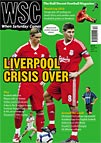Ian Plenderleith wonders why World Cup qualifcation is assumed to take precedence over politics in some countries
Now that Honduras have qualified for the World Cup their people can expect to be the beneficiaries of the usual condescending, quadrennial interest that western sports journalists pay all poor nations who qualify for the tournament. Curtly researched columns and reports from now until June will sagely conclude that life is tough for the majority, but football offers a way out of poverty for a lucky, talented few. For the fans, we will be told, football is an escape from reality, dangling hope and maybe even salvation. For the political leaders, it’s the chance to stoke up patriotism and distract from the country’s real problems. Because people in faraway countries are easily duped into forgetting a life of hardship when faced instead with the possibility of winning a football match.
This facile approach to reporting would be laughable if it weren’t so engrained that we’ve become used to watching it on repeat ever since football metamorphosed into More Than A Game. It’s a consequence of football’s inflated sense of its own importance in the modern world, born of FIFA’s bland, cyclical cliches about the game’s Christ-like powers of healing and unification, and a desire among sportswriters to pretend that they really are writing about something of deep significance, rather than a mere sporting contest that culminates in a numerical headline. This leads them to magnify football and, by proxy, themselves, as they trot out pat generalisations masquerading as geopolitical insight.
Such desultory coverage will attempt to celebrate countries like Honduras (to be known until next summer as “little Honduras”), but will always end up denigrating them. The German news magazine Der Spiegel kicked off by surmising that a few thousand fans out on the streets in the aftermath of the 1-0 victory in El Salvador that clinched qualification means that in a country of 7.8 million people “there is [now] a little time for diversion. Time to forget about political problems for a few days”. Referring to negotiations between ousted president Manuel Zelaya and his illegal successor Roberto Micheletti, slated for the day following the game, the magazine’s correspondent reliably reported that “nobody in Honduras on this day is interested in political and presidential problems”.
What, not a single person? Or is the writer mistaking spontaneous celebrations and the fact that the football team’s success was no doubt the number one news item that day, as meaning that all of a sudden nobody at all is interested in the political fate of their country? The penetrative psychic powers of journalists writing “mood of the nation” pieces is quite astonishing. Assuming that the majority of people in Honduras were happy with the result is one thing, but it’s a hugely imaginative leap from there to diagnosing a sudden affliction of national political amnesia.
There were very few articles this autumn suggesting that Spain’s perfect qualifying record will help the country’s 20 per cent unemployed cope with their jobless status. Italians have not been busy forgetting that they have a corrupt, fascist-allied, sexual predator as head of state, so busy were they celebrating that last-minute equaliser in Dublin. Jubilant US soccer fans were not seen as an indication that the nation was losing interest in healthcare reform. And thousands of England fans did not throw themselves into the Trafalgar Square fountains, blissfully drowning all thoughts of the morally vacuous Labour administration and the depressing prospect of a return to Tory rule. The reason that no journalist hammers out such asinine conclusions is because they would be demonstrable cant.
However, a country like little Honduras – with just over 50 per cent of its people living below the poverty line, in a state of political upheaval, but having reached its first World Cup since 1982 – is presumed to be so universally blinded by the euphoria of gaining Concacaf’s third World Cup qualifying spot that the entire population has simultaneously lost all sense of who they are and where they live. A handful of Hondurans interviewed on the street telling us that they are crazy about football will suffice to confirm all preconceived notions that this humble and sadly impoverished land will, bless them, at least enjoy the consolation of the world’s attention for three 90-minute time slots. And once they’ve been knocked out, we can all forget about little Honduras for another 28 years or so, except to recap their results in a trivia quiz.
Expect few or no serious attempts to examine the football culture or tradition in either Honduras or any of the other developing nations that qualify. Forget about a half-serious analysis of more than one or two (European-based) players, or an in-depth look at their weaknesses and strengths during qualifying. None of that suits the poverty/escape script. But there will be plenty of footage focusing on a happy-go-lucky band of loco fans with painted faces screaming for the camera, apparently typical representatives of a nation that’s just grateful to be in the final 32 and reportedly happy to be allowed to forget the fact that they live in the second poorest country in Central America. Thank FIFA there’s football to help the meek discount all their cares and sorrows. At least until the end of the group stage.
From WSC 274 December 2009
